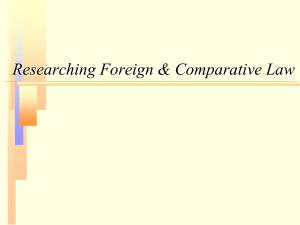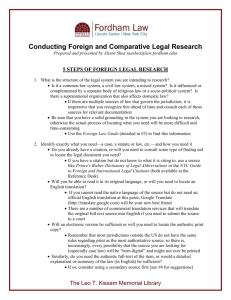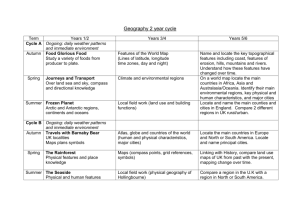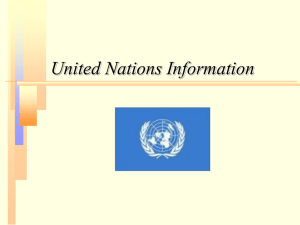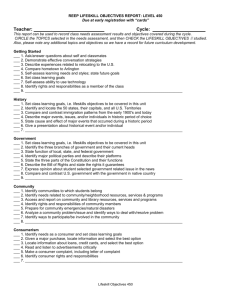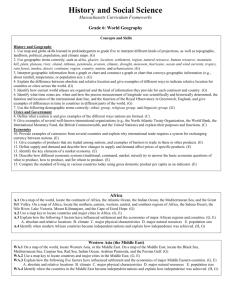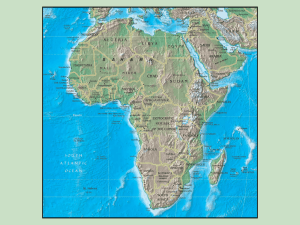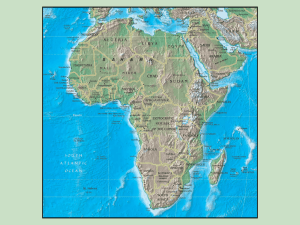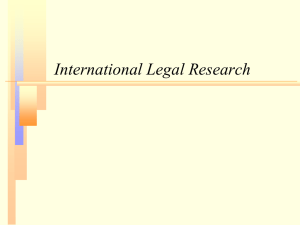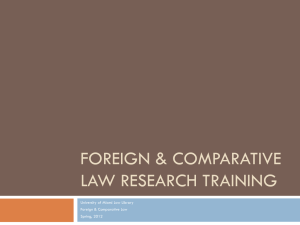Researching Foreign and Comparative Law ()
advertisement
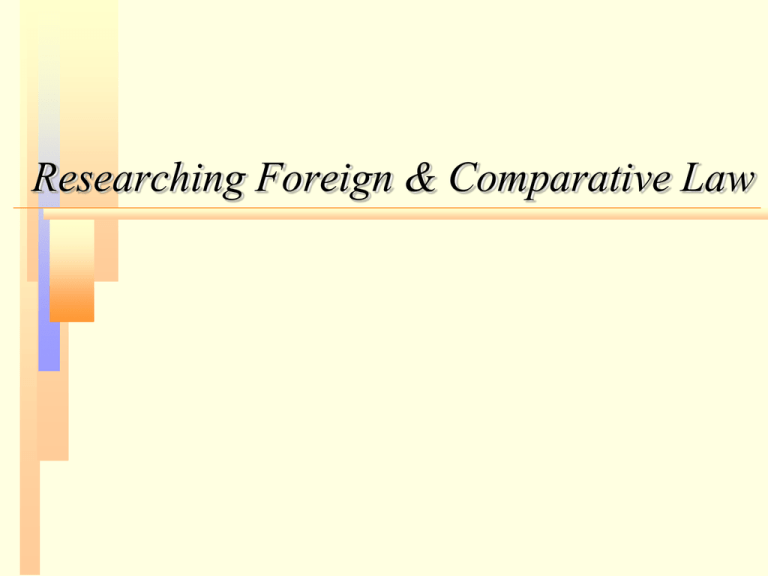
Researching Foreign & Comparative Law 5 Steps Of Foreign Legal Research 1. What is the structure of the legal system you are intending to research? • • • • Civil v. Common law Religious/political influences Supranational organizations Any domestic regional distinctions 5 Steps Of Foreign Legal Research 2. Identify exactly what you need—a case, a statute or law, etc.—and how you need it • Do you already have a citation, or will you need to consult some type of finding aid to locate the legal document you need? – If you have a citation but do not know to what it is citing to, use a source like Prince's Bieber Dictionary of Legal Abbreviations or the NYU Guide to Foreign and International Legal Citations (both available at the Reference Desk) 5 Steps Of Foreign Legal Research • Will you be able to read it in its original language, or will you need to locate an English translation? – If you cannot read the native language of the source but do not need an official English translation at this point, Google Translate (http://translate.google.com) will be your new best friend – There are a number of commercial translation services that will translate the original full text source into English if you need to submit the source to a court 5 Steps Of Foreign Legal Research • Will an electronic version be sufficient or will you need to locate the authentic print copy? – Remember that most jurisdictions outside the US do not have the same rules regarding print as the most authoritative source, so there is, increasingly, every possibility that the source you are looking for (especially case law) will be “born digital” and might not ever be printed – Be familiar with the local court rules just in case 5 Steps Of Foreign Legal Research • Similarly, do you need the authentic fulltext of the item, or would a detailed explanation or summary of the law (in English) be sufficient? – If so, consider using a secondary source first and then see if you can locate the entire primary source if the need arises 5 Steps Of Foreign Legal Research 3. Identify the sources of law for the country and locate those sources where available in the library’s collection by running a catalog search. Use the following resources to determine what you are looking for: Foreign Law Guide Fordham Law subscription database, access through this link: http://lawlib1.lawnet.fordham.edu/eresources/ erlinks/for_gen.html This source is the best starting point when you do NOT have a citation or do not know where to look for a particular law. Foreign Law Guide It is arranged by country, although not every country has an entry. Each entry will include a comprehensive essay detailing the development and function of the country’s legal system, followed by a finding aid tool for the major sources of law (i.e., codes/statutes, case law, etc.). The rest of the entry is organized alphabetically by topical subject headings (i.e., Antitrust, Bankruptcy, Corporate law, etc.) which will list both where you can find major controlling legislation for that topic as well as where you can find the topic discussed generally. Example #1 Your client wants to sail his yacht (yate in Spanish) to his vacation home in Mexico where he will stay for a month. • Using Foreign Law Guide, locate the Mexican law that deals with customs • Bonus points if you can locate the full text of it and find which provision deals with yachts GlobaLex http://www.nyulawglobal.org/globalex/index. html A fantastic source for research guides on any number of foreign, international and comparative law sources. The information and articles published by GlobaLex represent both research and teaching resources used by legal academics, practitioners and other specialists around the world who are active either in foreign, international, and comparative law research or those focusing on their own domestic law Example #2 What is the official publication source for legislation in the Vatican City? • Does Fordham University have a subscription to this source? 5 Steps Of Foreign Legal Research 4. Locate the full text of the document you need • Search for the source/reporter in the library’s catalog to see if we subscribe to it • Use the library’s Electronic Resources page to determine whether we subscribe to a domestic database: http://lawlib1.lawnet.fordham.edu/eresources/e rlinks/for_jur.html • Use one of the Worldliis • Look in GLIN • Use a subject-specific guide—i.e., look in NATLEX for labor laws, World Bank’s Doing Business for business laws, etc. Worldliis http://www.worldlii.org/ The World Legal Information Institutes are free, independent and non-profit access to worldwide law for a variety of jurisdictions, particularly good for UK materials (BAILII) and Asian-Pacific jurisdictions (AsianLII and PacLII) Example #3 Using BAILII (http://www.bailii.org) can you locate a 2010 High Court case dealing with the addition of a possible third runway at Heathrow Airport? LoC/GLIN http://www.glin.gov/ The Global Legal Information Network, run by the Library of Congress, is a public database of official texts of laws, regulations, judicial decisions, and other complementary legal sources contributed by governmental agencies and international organizations in their original languages. Each document is accompanied by a summary in English and, in many cases in additional languages, plus subject terms selected from the multilingual index to GLIN. Unfortunately it only contains information for about 30 countries at the present time, and even then the coverage can be spotty DoingBusiness http://www.doingbusiness.org/lawlibrary/ my all-time favorite site for free authentic full-text sources, in English whenever possible, this site is run by the World Bank and is the largest free online collection of business laws and regulations for almost every jurisdiction that the World Bank deals with, and now includes a compilation of gender laws intended to highlight how easy it is for female entrepreneurs to start a business 5 Steps Of Foreign Legal Research 5. If you prefer to start with a comparative source rather than locate individual jurisdictional sources, or if you have consulted the aforementioned compilations and are still unable to locate what you are looking for, consult a secondary source • Secondary sources often provide commentary on the legal issue, put the legal issue in context, and/or provide a summary of the relevant legal documentation 5 Steps Of Foreign Legal Research • Locate secondary sources in relevant research guides and through searching the library’s catalog • Various compilations reprint subject-specific legislation in English with some commentary. Examples of titles held in our library include: – Constitutions of the countries of the world (electronically through our electronic resources page and in print K3157.A2 C66) – Comparative Environmental Law and Regulation (K3585.4 .C65) – Investment Laws of the World (K1112 .A47 I59) – International Copyright Law and Practice (on LEXIS and in print K1420.5 .I5) How to locate…Constitutions Foreign Law Guide—may have direct links to full text but more often will point you in the direction of where to find it Ocean’s Constitutions of the Countries of the World (in print and online through the Fordham Law Library) World Constitutions Illustrated (HeinOnline) How to locate…legislation If you don’t have a citation… • your best starting point is Foreign Law Guide If you are looking for a comparative survey of laws… • try one of the subject-specific database like NATLEX, Doing Business Law Library, etc. If you have a citation already… • try one of the Worldliis, a subscription database for that country, or the country’s legislature’s website How to locate….case law If you do not have a citation… • try a secondary source, or if you have access to a subscription database for that country (i.e., Justis (UK), LawAfrica, iSinolaw (China)), try a full text search for the topic If you have a citation but don’t know where to find the source… • look up the abbreviation in either Bieber’s Citations or the NYU Guide, and then plug the name of the reporter into our catalog to see if we have access to it If you know exactly what you’re looking for • try the relevant Worldlii, or a subscription database for that jurisdiction—be sure you know the coverage limitations for each database so you do not waste your time looking for cases that are not reported there How to research transnational law Two step process to dealing with these issues: • Identify procedural aspects and private international law concerns – Forum – Service – Discovery – Local rules of civil procedure • Identify applicable foreign laws International procedural issues If the issue involves a US citizen or corporation, consult the State Dept’s collection of information • http://travel.state.gov/law/law_1734.html The Hague Convention has a number of treaties that provide guidance on international legal cooperation and litigation • http://www.hcch.net/index_en.php?act=text .display&tid=10#litigation Hague Conference on Private International Law and Conventions: Active in development of conventions in various areas of private law (e.g. conflict of laws to inter-country adoption). • http://www.hcch.net/e/index.html. Full-text conventions, status and bibliographic information, and explanatory reports, when available • Most useful are the status (where you can see who is a party), and the background/interpretive documents for each convention Example #5 If you wanted to take evidence in Korea, are there any Hague Conventions which would apply? • Does the US State Department issue any particular guidance for taking evidence in Korea?
